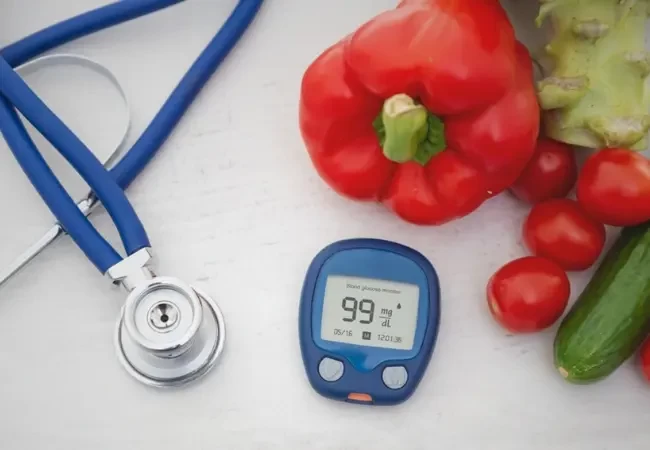Blog
Kidney Disease
& High Blood Pressure

The Link Between Diabetic Kidney Disease and High Blood Pressure
 Medically reviewed by: Dr. Manoj P Joseph, consultant Physician & Diabetologist - Written by Jasni Salim - Updated on 07/10/2024
Medically reviewed by: Dr. Manoj P Joseph, consultant Physician & Diabetologist - Written by Jasni Salim - Updated on 07/10/2024Millions around the world face a significant impact from the condition known as diabetic kidney disease (DKD) which results from diabetes. Prolonged elevated blood sugar causes the kidneys to become damaged. People with high blood pressure (hypertension) commonly have diabetes which speeds up the rise of diabetic kidney disease. Recognising the relationship between these two issues is vital for managing them and preventing long-term complications
What is Diabetic Kidney Disease?
Diabetic kidney disease, also known as diabetic nephropathy, is a form of kidney damage that results from diabetes and elevated blood sugar levels. The kidneys remove waste and extra fluids from the blood but people with diabetes might face obstacles in this regard. In the long run, kidney filtering systems break down leading to dysfunction.
DKD develops over time and might reveal no symptoms in the preliminary stages. As it progresses further patients might feel swelling in their legs find it hard to urinate become fatigued and have elevated blood pressure. Left untreated it can cause kidney failure which may necessitate the use of dialysis or a kidney transplant.
High Blood Pressure and Diabetic Kidney Disease
High blood pressure is a contributing factor and an outcome of diabetic kidney disease. The blood vessels in the kidneys face damage which hinders their capacity to remove waste. The kidneys regulate blood pressure, and when their ability decreases, blood pressure may increase further creating a vicious cycle.
The relationship between hypertension in diabetes and kidney damage is particularly dangerous because both conditions can exist without obvious symptoms in their early stages. High blood pressure can silently worsen kidney damage, while kidney dysfunction can elevate blood pressure, increasing the risk of heart disease, stroke, and further kidney decline.
How Hypertension Worsens DKD
The presence of high blood sugar alongside high blood pressure hastens kidney damage in diabetic individuals. An increase in blood vessel pressure due to hypertension puts extra strain on the kidneys' filtering units (glomeruli). Repeatedly this produces a build-up of scar tissue and thickening of the blood vessels making the kidneys less effective in filtering blood effectively.
Insulin resistance coupled with the transformation of blood vessels due to prolonged elevated sugar increases hypertension chances among patients with diabetes. Keeping blood pressure in check is vital for limiting the advancement of diabetic kidney disease and preventing further complications.
Managing Blood Pressure in Diabetic Patients
The first step in the treatment of diabetic kidney disease involves regulating blood sugar levels. Managing and controlling high blood pressure level is vital for retarding kidney damage. Healthcare providers typically recommend several strategies for blood pressure management in diabetic patients:
- Medications: Angiotensin-converting enzyme (ACE) inhibitors or angiotensin II receptor blockers (ARBs) are commonly prescribed to help lower blood pressure and protect the kidneys. These medications not only reduce blood pressure but also reduce the strain on the kidneys by dilating blood vessels.
- Dietary Changes: Eating a diet rich in fruits and vegetables while limiting sodium and processed foods can lower blood pressure. Individuals with diabetic kidney disease should consider reducing their protein consumption to lessen the load on the kidneys.
- Regular Exercise: Atleast thirty minutes of moderate exercise daily assists in lowering blood pressure and sugar levels while enhancing kidney function.
- Weight Management: Obesity enhances the likelihood of type 2 diabetes and high blood pressure. Staying at a healthy weight can help improve blood pressure and slow down the development of diabetic kidney disease.
- Limiting Alcohol and Quitting Smoking: Drinking excessive alcohol and smoking leads to higher blood pressure and damage to kidney health. Quitting smoking and cutting back on alcohol use are necessary modifications for patients managing diabetic kidney disease or high blood pressure.
Related Blog Posts :
The Importance of Early Detection
Because diabetic kidney disease and hypertension in diabetes typically progress slowly without apparent symptoms identification at an early stage is necessary. Identifying these conditions in their early stages is vital; thus regular screening for blood pressure; kidney function; and blood sugar levels is important. Healthcare professionals may recommend tests such as blood pressure measurements, urine tests for protein (albumin), and blood tests to monitor kidney function in patients at risk.
Conclusion
The relationship between diabetic kidney disease and high blood pressure is intricate and risky. To safeguard kidney health and reduce risks of complications both conditions need management via lifestyle changes, medication, and regular monitoring. Timely intervention and steady medication can slow the development of diabetic kidney disease while letting patients maintain a healthy lifestyle.

More Blogs
-

Struggling with Erection or Early Ejaculation? Here's How to Get Help
Struggling with erectile dysfunction or premature ejaculation? Learn common causes, treatments, and how to seek professional help with confidence.
-

When Should Diabetics Eat? Expert Tips on Meal Timing and Blood Sugar Control
Learn how diabetics can optimize meal timing to better control blood sugar. Expert tips for healthier, more balanced living.
-

Facing the Fear: Understanding Psychological Erectile Dysfunction Before Marriage
Discover the causes and solutions for psychological erectile dysfunction before marriage. Gain insight, support, and confidence for a healthy relationship.
-

Why Overweight Individuals Should Embrace Early Dinners
Ready to lose weight smarter? See why early dinners are a game-changer for overweight individuals aiming for lasting health and weight control.
-

Overweight? Start with This One Powerful Lifestyle Change
Struggling with weight? Most of us eat our heaviest meal of the day at night, usually after 9 or even 10 PM.


 Home
Home  Booking
Booking
 Chat Now
Chat Now  Call Us
Call Us